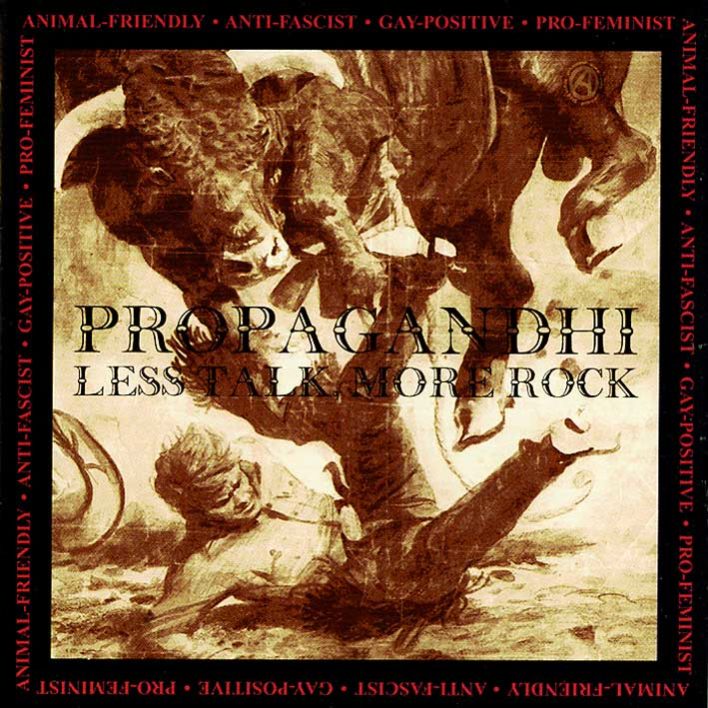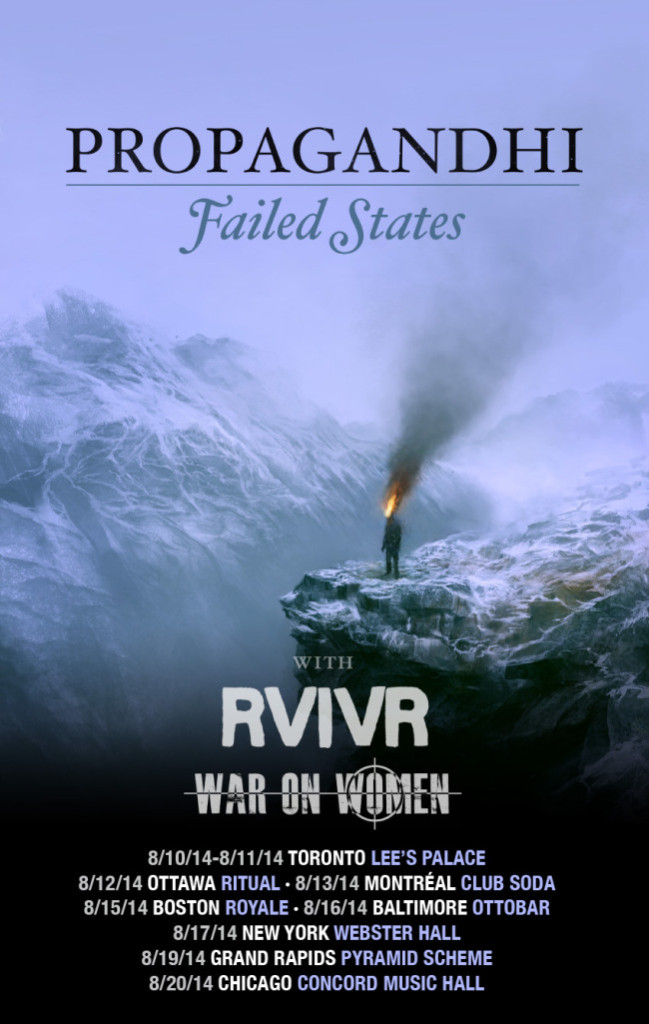Propagandhi #1: “…And We Thought Nation States Were a Bad Idea”

By Matthew Stella
Propagandhi plays Ritual on August 12th with RVIVR and War on Women. In the lead-up to the show, longtime fan Matthew Stella will reflect on how the band has impacted his life by reviewing a different Propagandhi song every day until August 12th.
Song: “…And We Thought Nation States Were a Bad Idea”
Album: Less Talk, More Rock
Year: 1996
First Listen: 1997
“Publicly subsidized, privately profitable, the anthem of the upper tier puppeteer untouchables.
Focus a moment, nod in approval, bury your heads in the barcodes of these neocolonials.”
If you’ve ever seen someone who doesn’t speak English singing a song in English, you can’t help but notice that there is something a little too perfect about the way they pronounce the words. In the absence of knowing the meaning of what they’re singing, they put all of their effort into the flawless phonetic construction of each word. The same could be said about me as a 13-year-old in Thunder Bay, Ontario singing the opening lines to “Nation States” by Propagandhi.
I had only just gotten into punk through mid-90s skate punk giants NOFX, Pennywise and Epitaph’s Punk-o-Rama compilations. But when I was introduced to a new label – Fat Wreck Chords – and their Survival of the Fattest compilation, my entire idea of punk changed. I shouldn’t say “changed,” rather it became more complete. Until then I hadn’t even realized that anything was missing in my punk education (how young and naive I was).
“Nation States” was the fourth song on the album, and as Chris Hannah tore through those opening lyrics, I remember thinking, “This is it! This is what I thought punk was going to be.” I didn’t have a clue what he was singing about, or what I was saying when I sung along. For the longest time I thought a “neocolonial” was some kind of caveman. But the anger and emotion in the song was palpable. I could tell that Hannah was angry, and that he was vaguely political, but as to the source of his anger I hadn’t a clue. By the time the chorus arrived, the lyrics became less compact and Hannah shouted “What a stupid world!” That was enough to bring this 13-year-old kid on board. I borrowed a tape of Propagandhi’s Less Talk, More Rock – released one year earlier – and proceeded to listen to it every day – on my walks to and from Sir Winston Churchill High School – for the entirety of Grade 9. Eventually I knew the lyrics to every song on the album by heart, but did I really know the words?
My experience with Propagandhi is not unique. This band holds a special place in a lot of peoples’ hearts (and minds). They were the band that changed the way we think, even though we initially only had a vague idea of what they were saying. More than songs, the band sings essays with proof points laid out in the verses to back up the thesis statements shouted during the chorus. As an angsty pre-teen I was won over by the choruses, but it was uncovering the meaning behind their slogans that has kept me, and many others, still listening almost 20 years later.
So why was it a stupid world? What was Hannah singing about in “Nation States”? I didn’t really need proof of the stupidity of the world when I was 13, but I wouldn’t still be singing along now if this song was simply a clichéd slogan. Instead it is a compact, yet well detailed, analysis of neoliberalism.
Our governments subsidize big businesses in a number of ways (tax breaks, relaxed labour laws, bailouts, negligible interest rates, etc.), but what happens when these businesses make a profit? Does the public that subsidizes a business share in its profits? Of course they don’t. So when it comes to influencing government what does the upper tier (puppeteer untouchables) do? They lobby to continue this cycle of profiting from the government while assuming little risk in the operation of their businesses. This is the dominant ideology of our day, government becomes a tool of transferring the collective wealth of the lower classes to the few hands of the upper. Is this class war? Yes, this is class war. And this system has only become more clearly visible in the wake of the 2008 financial crisis. So what do we do as citizens to confront this system of public risk and private profit? Well we’re too busy consuming the products made by these businesses to notice.
That is the best I can do to extrapolate what Hannah is able to say in two lines.
The actual full name of the song is “…And We Thought Nation States Were A Bad Idea*” referring to the fact that anarchists traditionally fought against the state, but by the 90s were seeing states ceding control of the global economy to multinational corporations. The song is essentially Chris thinking out loud, trying to decide which is worse. “And I’m just a kid. I can’t believe I gotta worry about this kind of shit,” he yells just before the chorus, reminding all the kids who are listening listening that worrying about the global economy isn’t something anyone necessarily wants to do.
It took me until about my third year of a political science degree to be able to explain this song. This is what I believe to be the beauty of Propagandhi’s message and why I still consider them the best band on the planet. They are a band whose message grows with you. Each subsequent listen provokes a reevaluation of the song based on new information and new experiences.
As for the ongoing role of corporations determining the structure of the global economy, and thus all of our lives… I’m 31, I can’t believe I (still) have to worry about this kind of shit.
______________
* The song was listed as “Nation States” on Survival of the Fattest compilation and “…And We Thought Nation States Were a Bad Idea” on Less Talk, More Rock.

